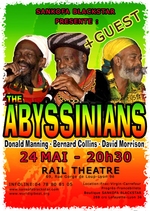
Les Abyssinians est un des groupes les plus célèbres de l’histoire du Reggae. Formé en 1968 par Bernard Collins,
Donald Manning rapidement rejoints par
le frère du second, Linford. Ils furent inspirés par les grands chanteurs de soul américaine tels que Sam
Cooke ou Curtis Mayfield.

Du côté Reggae, les artistes de l’époque Alton Ellis, Delroy Wilson et Ken Boothe bercèrent le trio. La carrière des
Abyssinians est atypique puisqu’ils vont rencontrer très vite un succès mondial avec leur titre "Satta Massagana"
qui est un rythme Rastafarien basé sur la language Amharic originaire d'Ethiopiae. Ce titre
est le premier morceau produit par Bernard Collins, en 1969, sur le label qu’il venait de créer, Clinch (du nom du symbole
Black Power). Il est intéressant de noter qu’à l’époque de l’enregistrement du morceau chez Studio One, Clement Coxsone
Dodd fit payer seulement 70 pounds pour la location du studio.
Leur second gros tube fut "Declaration of Rights". Nous sommes en pleine époque de la lutte des Noirs pour s’émanciper
du joug de la bourgeoisie blanche de l’île. Ce morceau fut très bien accueilli en Jamaïque. Très influencé par la
philosophie Rasta, le trio produira essentiellement des textes « conscious ».
Dans la discographie du groupe on
retiendra particulièrement les albums "Satta Massagana" (sorti en Europe sous le titre "Forward on to Zion"), "Forward,
Arise". Ces albums sont, depuis, entrés dans l’histoire du Roots Reggae comme des incontournables. C’est à la suite
de ce dernier album (Arise) que Bernard Collins quitte le groupe. Donald et Linford sont rejoints à l’époque par
leur frère Carlton. Il semble que la brouille ait porté sur les royalties de Satta. Il faut dire que ce morceau
fut l’un des plus remixés, que cela soit en version dub ou en riddim. Ainsi, des artistes de toutes les époques ont
posé sur ce riddim, que cela soit Big Youth, Augustus Pablo, Sizzla, Capleton, Shabba ranks, I Roy... Les choses se
sont depuis arrangées, le trio s'est reformé et on a pu l'applaudir lors d'une grande tournée en 2003.
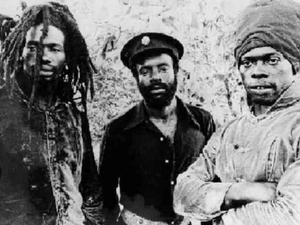


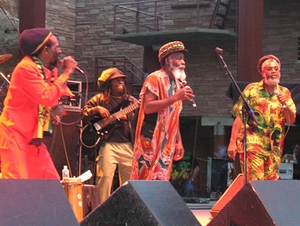
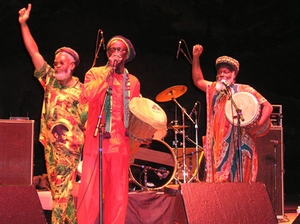
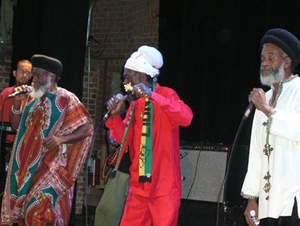
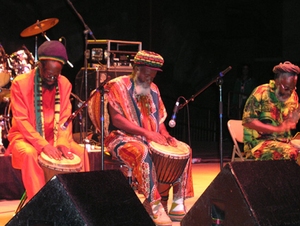
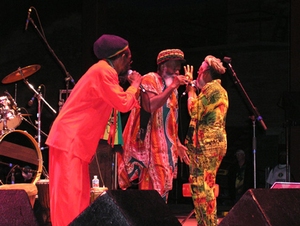
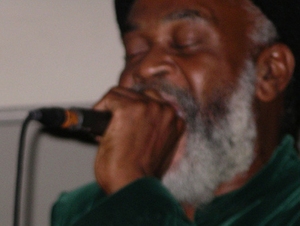
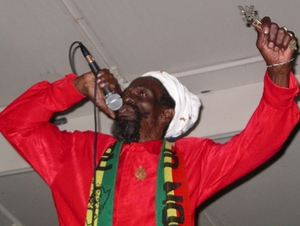
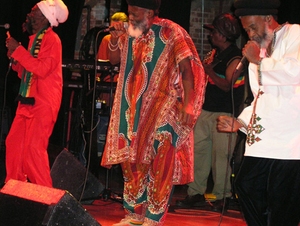
The roots harmony vocals trio the Abyssinians was formed in 1968 by founding members Donald Manning, Bernard Collins and Linford
Manning. It was in 1969 with their release “Satta Massagana” recorded on Coxson Dodd’s Studio One label—a Rastafarian hymn based
on the Ethiopian Amharic language, that launched them into the ranks of Reggae music greats. “Satta Massagana” became one of reggae’s
most popular songs; becoming an anthem that was heard on the radios, in the dancehalls and in the churches of Jamaica. It was also
covered by many other International artists’ including Third World. What followed were a string of hits of which
included "Declaration of Rights," "Yi Mas Gan." and “Let My Days Be Long”. Early albums were a collection of singles
recorded throughout the 1970’s on their own label—Clinch, of which included “Forward On To Zion” (1976) and “ARISE” (1978).
The group separated in 1980, during the separation group co-founder Donald Manning performed internationally under the name
The Abyssinians with his brother Carlton Manning (of Carlton & The Shoes) and singer David Morrison. In Jamaica, Bernard Collins
performed on stage with longtime associate George Henry.. In 1989, Donald, Bernard and Linford joined together again to record
over the next three years. These sessions resulted as the originally released album, “$19.95 + TAX” in 1995 with a very limited
number of CD’s printed. Artists Only! Records realized the importance of this album and in 1998 re-titled and re-released this
album as “REUNION”. “REUNION” now stands strong as one of The Abyssinians greatest albums.
In 2004, Donald Manning & Bernard Collins reunited on stage for the first time in over ten years along with singer David Morrison,
performing on tour across Europe in the winter, at Colorado’s Reggae on the Rocks in the summer, and in December on a two week
tour along the California coast . In February and March of 2005 they returned for an extended tour of Europe, and during the
Summer of 2005 they toured the West Coast throughout California, Oregon and the Rocky Mountains in Montana, Utah, and Colorado.
During the Summer they also performed at The 12th Annual Sierra Nevada World Music Festival, The 10th Annual Monterey Bay Reggae
Festival and The 4th Annual Soul Rebel Festival.
Until Heartbeat Records reissued Satta Massagana (a.k.a. Forward Onto Zion) in 1993, few groups in reggae were more of an
enigma than the Abyssinians. "Satta Massagana," has been referred to as "reggae’s national anthem." The recording session
that yielded "Satta" was arranged and financed independently and clearly marked a turning point for reggae -- lyrically,
rhythmically, and spiritually.
Donald Manning explains how the song was born. "Carlton [Manning] wrote ‘Happy Land’ [b-side to ‘Love Me Forever’] with
lyrics, ‘There is a land far, far away, where there’s no night, there’s only day. Look into the book of life, and you will
see that there’s a land far, far away.’"
"Satta Massagana" (meaning ‘give thanks’) is obviously notable for its use of Amharic, the language of Ethiopia (Abyssinia). The
Amharic is a result of Donald Manning’s Rastafarian influence on the group. The study of Amharic in Kingston in the 60s was a
function of the post-colonial, Pan-African identity and Rastafarian awareness sweeping the ghetto after Haile Selassie’s 1966
visit to the island. Collins recalls how Donald’s brother Neville used to teach Amharic in the Jonestown area of Kingston. "[He]
was a man who used to . . . have classes around there, where we could all go and learn the language, cause he used to get books
from Ethiopia through England -- Ethiopian opinions. And those books contain all literatures that we need . . . That’s how come
we get acquainted with the Amharic . . . Bredren from all about used to come there and learn."
Donald Manning explains the Amharic in some of the group’s well-known compositions. "Tena Yi Stillin. Dina Igzhabhier Y Mas Gan.
Satta Massagana.’ When I say ‘Dina’ means ‘good,’ ‘Igzhabier’ means ‘God,’ ‘Y Mas Gan,’ [means] ‘he may be praised,’ so I correct
the mistake that I made by singing ‘Satta Massagana’ [to God]. ‘Tena Yi Stillin’ means ‘greetings.’ It means ‘good morning.’ It
means ‘good bye.’ It means ‘good afternoon.’ It means ‘health, may He give for thee.’"
The legendary "Satta" recording session included Leroy Sibbles on bass, Fil Callendar on drums, Eric Frater on guitar, Robbie Lyn
on keyboards, Vin Gordon on trombone and Felix "Deadley Headley" Bennett on saxophone. "That tune really, no one specially [gave]
a specific arrangement to that song," recalls Bernard Collins. "We went there singing the song on our guitars. Cause we had like
the melody progression. So we went there playing the chords and everything on the guitar, and while we play, everybody just came
in. Cause these men were professional musicians . . . You haffe say they did all the arrangement really, Leroy Sibbles feel out
his own bass line, Deadley Headley . . . cause we didn't go in there with no special arrangement -- just the basic chords and the
progression of the song and the melody. Is just a vibes tune.
"[We] released it first on Clinch, it was released as ‘Far Away Land.’ It wasn’t till after a time, Donald Manning say we should
call it ‘Satta Massagana,’ and then we actually register the song as ‘Satta Massagana,’ [with] all three members owning the
copyright. All three of us rallied around to help get it pressed, get to the record shops, and everything.
"We record that song [‘Satta’] in March 1969, and it wasn’t till about 1970 that [producer] Joe Gibbs actually [remade] a
recording of it. He was the first one who did a rerecording version, [which] he called ‘A So,’ an instrumental with the
Destroyers. That him do [with] Tommy McCook, Bobby Ellis, and him come by some other hornsmen. And it playin on the radio.
It [was] just an instrumental. But . . . instrumental versions just bring back the record right back to the people, because
when it [was] released first, it used to just play in the dancehall. Because ‘Satta’ is really a dancehall tune in those days.
Home buyers never have it. It was just sound system people, but it wasn’t until Joe Gibbs bring out this version that everybody
start going at this song."
The original "Satta" recording was ‘versioned’ (remixed and/or re-voiced) more than a dozen times, including the Abyssinians’
own remake "Mabrak," a direct response to Joe Gibbs’ "A So." Instrumentals included "Thunderstorm" featuring Bongo Herman, and
several Tommy McCook/Vivien Hall horn overdubs including "Mandela." Collins later re-voiced the song as "Satta Me No Born Yah."
Prince Far I, Big Youth, Dillinger and others also took shots at the rhythm. Since its debut in 1969, nearly every producer in
reggae has remade "Satta," and literally hundreds of remakes of the song exist.
Collins says that "Satta" is at the root of modern dancehall and dub. "[‘Satta’] was like the first dancehall song. And the
first dub, ‘Satta Massagana.’ . . . if you listen to the flip side of ‘Mabrak,’ same ‘Satta’ version . . . is drum and bass.
Because we record that tune on two-track [two-channel tape recorder]. When I was at the studio one day, cutting a pure stamper,
one of my bredren just put it on single track [one channel], and we just get the drum and bass. And him say, ‘but wait, this
sound good mon!’ And we just release the flipside of ‘Mabrak,’ which is ‘Issat’ -- pure drum and bass. And that used to play
in the dancehall, regular. Cause we used to sell a lot of dub plates, like a special to sound systems -- Sir George, Tubby’s,
and all them ready soun (soundsystems). Cause we get the dub wax of it right in the dancehall, and from there on you find the
dub and version start springing up. From 1970 come down . . . Version business!" The Abyssinians were featured performing "Satta"
in a capella style in the film Roots, Rock, Reggae in 1976 and again in Rockers in 1978. These are the only known film appearances of the original trio.
Carlton Manning’s key role in mentoring the Abyssinians is comparable to the role Joe Higgs played with the Wailers years
earlier. Not only did Carlton Manning coach the trio in the minor chord harmony singing that would define its style, but he taught
Donald to play the guitar. Donald Manning recalls his brother’s efforts. "Most of the harmony that we sing, Carlton teach us,
because me and Bernard was singing together and Carlton told me that because I was playing the guitar, Bernard will sing [more]
leads than I do . . . so I must sing the harmony."
Carlton Manning explains how the minor chord harmony style that he developed with The Shoes characterized The
Abyssinians. "[My] harmonies are mainly minor chords on a 7th, 9th, 13th [tertian (3rds)] harmony. If you know
the [guitar], you deal with the chords and formulate the harmonies from there if the artists can take it. Minor chords are
intricate. The scales are not the regular scales. You have to know what you’re doing musically. [That’s how] you get the Far
East sound."
From the early to mid-70s, the Abyssinians recorded sparingly, but the quality of the group’s work was remarkable. Bernard Collins
returned to Studio One in 1970 (without the Manning brothers) to record "Declaration of Rights" with George Henry and Leroy Sibbles
singing backing vocals. The recording featured an essential arrangement and organ melody by Jackie Mittoo and rhythm by Leroy
Sibbles on bass and Leroy "Horsemouth" Wallace on drums. Notably, the song was one of Bob Marley’s favorites, and a lyrical
influence can be heard on The Wailers’ well-known "Get Up, Stand Up" recorded in 1973.
The next Abyssinians recording sessions yielded "Let My Days Be Long" and "Poor Jason Whyte," both released as 45s on the
group’s Clinch label. Another of the group’s most enduring tracks was "Y Mas Gan," recorded for Lloyd "Matador" Daley in 1972.
Other singles, including "Reason Time," "Leggo Beast," and "Love Comes and Goes" followed by the mid-70s.
The Abyssinians’ first full album was recorded in 1976 and is regarded as one of the greatest in the history of Jamaican music. The
sessions were supervised by Clive Hunt and resulted in the album known both as Forward Onto Zion and Satta Massagana. Every track
exudes the spiritual essence of the Abyssinians. Regrettably, the tapes were pirated, and the album didn’t see legitimate
release until Heartbeat (US) and Blue Moon (France) released it in the mid-90s.
Collins recalls the sessions for the album. "It’s a really original album. Everybody put themself in it. I know I put myself deep
in that album. And I figure the other bredren also.
"The story is . . . you have a company at that time here name Sound Tracs [run by] Pat Cooper. You had guys like Clive Hunt,
Geoffrey Chung, Mikey Chung -- all of the top notch [musicians] working with the company. Donald told me these people would
like to record the album, so we went there and lay down ten tracks. . . but before the album finish is like . . . something
went wrong within the company. I don't know what go wrong, but the director of the company actually went away to the States.
Clive Hunt had the tapes, and when we check Clive Hunt fe find out what going on with the album, he told us that everybody
gone, and the most him can do is take the tape and try and make some money for himself. So him start printing the records
here [in Jamaica]."
The group’s deeply spiritual, africentric lyrics were crystallized on virtually every cut on the album, and it featured remakes of "Satta," "Declaration of Rights," and "Y Mas Gan." Donald Manning’s masterpiece "African Race" is one of defining compositions of the album and of the group’s career. After a seductively beautiful acoustic guitar solo by Mikey Chung, the song erupts into a chilling roots anthem. The lyrics speak with pride of African heritage and survival of slavery. Donald Manning explains the inspiration. "I went to the movie theater in Jamaica name Tropical. And them was showing a movie . . . them was bringing slave from Africa, and the movie make I cry . . . when I see what them do to the slave them. When them was rowing the boat, the man beat the drum for them to pull the oar . . . and when them could not row the boat anymore, them throw them overboard and some of them die. Some of them jump overboard and a lot of different, wicked, evil things happen. That's why I make that song, 'we are the slave descendent from the African race. We are proud, it's no disgrace.’"
Despite the illegitimate release of the Clive Hunt sessions, the success of the "Tenayistillin" single in England gained the
Abyssinians enough credibility with Virgin that the group became one of the crop signed to the UK giant in 1978. The fruit of
the Virgin deal was the Arise album, a good effort but certainly not the cornerstone that the group needed for international
commercial success. The underexposure of the Clive Hunt sessions was one of the major tragedies of the Abyssinians’ career.
The group gained some exposure through its performance at Sunsplash II in 1979, although the performance was not included on
the documentary film of the event.
Forward, released in 1982 by Alligator in the US, collected some early tracks like "Jerusalem" (b-side to the original "Satta" 45),
"Mabrak," "Peculiar Number," several superb Bernard Collins solo cuts, plus "Forward Onto Zion" and the remake of "Satta," both
from the Clive Hunt sessions.
The Abyssinians were inactive during the mid-80s, because Linford Manning left Jamaica in 1980, and Donald left in 1984. Bernard
Collins went to New York in 1986 to work on an album at Phillip Smart’s HC&F studio on Long Island. Many of those tracks would
be used for the Last Days album. The Abyssinians would play Sunsplash in Jamaica in 1989 and in Europe in 1990, and then
Linford Manning left the group for good. The group performed again on Sunsplash 92 in Montego Bay.
During the 90s, the Forward album was released on CD (Musidisc), as well as set called Best Of (Musidisc), which features
many hard to find singles from the early years of the group. Satta Dub (TABOU.1) and Declaration of Dub (Heartbeat) feature
Karl Pitterson dub mixes of many tracks from the Clive Hunt sessions alongside other selected dubs. Virgin reissued Arise on
CD in the early 90s.
Collins understands the struggle the Abyssinians still must endure to ensure the name is known and remembered. "In Jamaica
here now, the Abyssinians do have a name, yes, in a certain area. If you call upon ‘Satta Massagana,’ ‘Declaration of Rights,’
everybody knows those songs, but if you say ‘Abyssinians’ to most of the young youths, they don’t know. Sometime them don’t even
know what the word ‘Abyssinian’ mean. They never hear that word before. But if you say ‘Satta Massagana’ or ‘Declaration of Rights,’
they know the song."